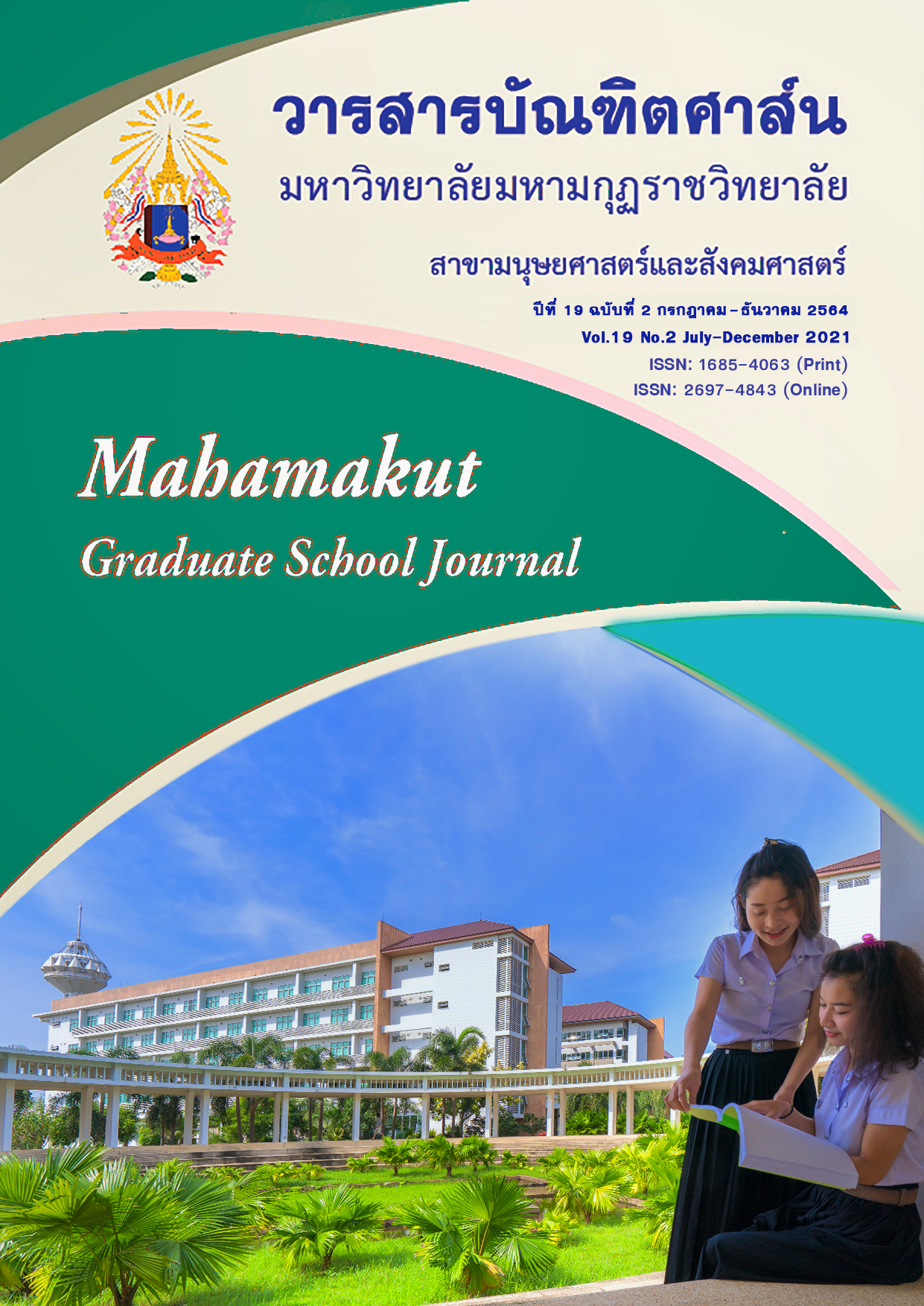หลักการพิจารณาโทษผู้กระทำความผิดทางวินัยตามพุทธบัญญัติ และความผิดทางอาญา ตามประมวลกฎหมายอาญา ศึกษาเปรียบเทียบความเหมือนและความต่าง
คำสำคัญ:
หลักการพิจารณา, ผู้กระทำความผิด, กฎหมายอาญาบทคัดย่อ
บทความเรื่อง “หลักการพิจารณาโทษผู้กระทำความผิดทางวินัยตามพุทธบัญญัติ และความผิดทางอาญา ตามประมวลกฎหมายอาญา ศึกษาเปรียบเทียบความเหมือนและความต่าง” เพื่อศึกษา หลักการพิจารณาโทษผู้กระทำความผิดทางวินัยตามพุทธบัญญัติ และความผิดทางอาญาตามประมวลกฎหมายอาญา และเปรียบเทียบความเหมือนและความต่าง ผลการศึกษาสรุปว่า “ความเหมือนและแตกต่างกันอย่างมีนัยสำคัญ 4 ประการ คือ ประการที่หนึ่ง กระบวนการฟ้อง อนุวาทาธิกรณ์เป็นการฟ้องร้องภิกษุทั้งที่ประพฤติผิดหลักรหมจรรย์เท่านั้น ส่วนการฟ้องอาญาเป็นการฟ้องร้องแก่ผู้ก่อให้ความเสียหายจากผลการกระทำผิดอาญาเท่านั้น ประการที่สองกระบวนการพิจารณา สัมมุขำวินัยเป็นวิธีระงับอธิกรณ์โดยทำการไต่สวน สอบสวนโดยซึ่งหน้า ส่วนหลักการพิจารณาตามประมวลกฎหมายอาญาในศาลชั้นต้นเป็นการพิจารณาและสืบพยานในศาลมีองค์คณะผู้พิพากษาเพียง 2 คนเท่านั้น ประการที่สาม กระบวนการพิพากษา เยภุยยสิกาเป็นวิธีระงับข้อปัญหาวิวาทาธิกรณ์ที่เกิดขึ้นในหมู่สงฆ์จำนวนมาก พระพุทธองค์จึงทรงกำหนดให้ใช้วิธีการจับสลากออกเสียงลงมติ ส่วนการพิพากษาในส่วนของคประมวลกฎหมายอายา คือ การทำคำพิพากษาหรือคำสั่งของศาลเมื่อคดีเสร็จการพิจารณา โดยมีผู้พิพากษาเจ้าของสำนวนและผู้พิพากษาองค์คณะอีกคน เห็นชอบด้วย ใช้วิธีจับสลำกไม่ได้ ประการที่สี่กระบวนการระงับโทษ ปฏิญญาตกรณะ เป็นวิธีการระงับที่ชอบด้วยพระธรรมพระวินัย แต่ถ้าจำเลยรับผิดหนักกว่าหรือเบากว่าที่ถูกโจท และสงฆ์ปรับอาบัติตามนั้น ติณวัตถารกวินัยเป็นวิธีระงับอธิกรณ์ที่ใช้ในเมื่อจะระงับลหุกาบัติที่เกี่ยวกับภิกษุจำนวนมาก ในส่วนของประมวลกฎหมายอาญา การลงโทษหากเป็นโทษจำคุกไม่เกินสองปี จำเลยไม่ได้รับโทษจำคุกมาก่อน หรือปรากฏว่าได้รับโทษจำคุกมาก่อน ศาลอาจพิพากษาว่า ผู้นั้นมีความผิดแต่รอการลงอาญาไว้ก็ได้
เอกสารอ้างอิง
Brooks wright, Sir Edwin Arnold. (1904). The Light of Asia. New York Times, (March 25, 1904): 24-229.
Brooks wright,Sir Edwin Arnold. (1950). A Literary Biography of the Author of The Light of Asia. Doctoral Dissertatoin Departmant of English. Graduate School: Havard University.
Einstein, Albert (1905 d). "On the Electrodynamics of Moving Bodies". Annalen der Physik, 17: 891–921.
Einstein, Albert (1905 e). "Does the Inertia of a Body Depend Upon Its Energy Content?". Annalen der Physik. 18: 639–641.
Herbert L. Packer. (1968). The Limits of the Criminal Sanction. California: Standford University.
Jonathan Herring. (2007). Criminal law. England: Palgrave Macmillan.
Klaus Luderssen. (1976). Petty Offenses. The American Journal of Comparative Law.
Kongsak Tanphaijit. (2009). Puttachariya. Bangkok: DMG.
Nakorn pojanaworaphong, Pholprasit Ritruksa. (2007). The Code of Criminal Procedure. Bangkok: Charoenkit.
Phradhammapitaka (P.A. Payutto). (2000). Buddhist dictionary Word edition. (9th edition). Bangkok: Mahachulalongkornrajavidyalaya Printing House.
Phradhammapitaka (P.A. Payutto). (2000). Get to know the Tripitaka to become a true Buddhist. (2nd edition). Bangkok: Edison Press Products Printing House.
Phradhamkittiwong (Thongdee surateocho, Pali IX, The Royal Academy). (2008). Buddhist Education Dictionary Khamwatseries. (3rd edition). Bangkok: Thammapha and Banluetham Institute.
Phrakrukalyansittiwat (Saman Kalayanadhammo). (2006). Buddhist canon 227. Bangkok: Mahachulalongkornrajavidyalaya Printing House.
Sak KosangRuang. (2007). The Code of Criminal Procedure. Bangkok: Nitibannakan Publishing House.
Suchep Poonyaphap. (1998). Dictionary of Buddhism. (Edition 8). Nakhonpathom: Mahamakutrajavidyalaya Printing House.
Yud Saenguthai. (2017). An introduction to general law. Bangkok: Se-Education Public Company Limited.
Wan Suwannapong. (2015). A comparative study of the principles in punishing the offenders of the code of monastic discipline and the code of criminal law. A Thematic Paper of the Degree of Doctor of Philosophy (Buddhist Studies). Graduate School: Mahachulalongkornrajavidyalaya University.
ดาวน์โหลด
เผยแพร่แล้ว
รูปแบบการอ้างอิง
ฉบับ
ประเภทบทความ
สัญญาอนุญาต
ลิขสิทธิ์ (c) 2021 มหาวิทยาลัยมหามกุฏราชวิทยาลัย

อนุญาตภายใต้เงื่อนไข Creative Commons Attribution-NonCommercial-NoDerivatives 4.0 International License.
บทความวิชาการและบทความวิจัยในวารสารฉบับนี้ถือเป็นความรับผิดชอบของผู้เขียนเท่านั้น บทความที่ได้รับการตีพิมพ์ในวารสารบัณฑิตศาส์น ถือเป็นลิขสิทธิ์ของมหาวิทยาลัยมหามกุฏราชวิทยาลัย ตามพระราชบัญญัติลิขสิทธิ์



